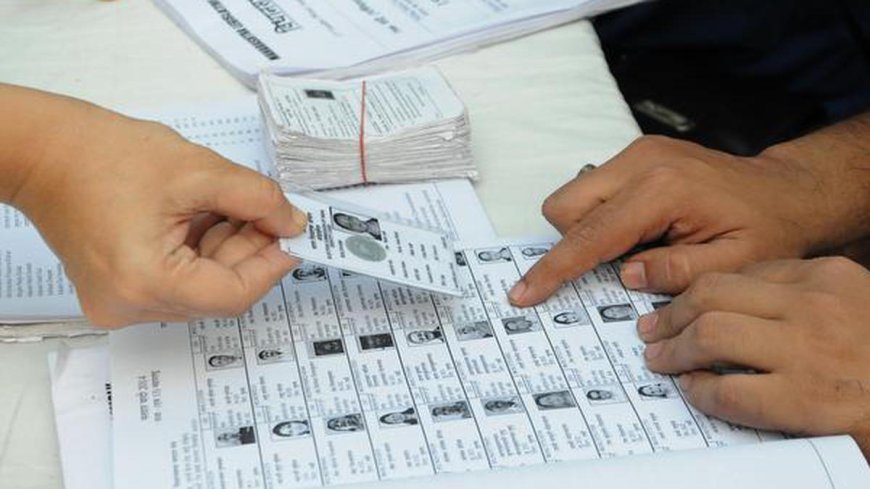Bihar Electoral Roll Revision Triggers Political Uproar Ahead of State Polls
Bihar’s special electoral roll revision has sparked opposition anger over alleged voter suppression. CEC Gyanesh Kumar defends the move as essential for accuracy ahead of state elections.

Patna, July 7, 2025 — A fresh controversy has erupted in Bihar’s political landscape as the Special Summary Revision of Electoral Rolls initiated by the Election Commission of India (ECI) has sparked sharp backlash from opposition parties. With state assembly elections on the horizon, the revision process — typically a routine administrative affair — has become a contentious political flashpoint.
The Chief Election Commissioner Gyanesh Kumar, addressing growing concerns and allegations, defended the Commission’s decision to undertake a Special Intensive Revision in Bihar. He acknowledged widespread dissatisfaction but maintained that the exercise is aimed at ensuring accuracy, inclusiveness, and transparency in the state’s voter database.
Why the Voter List Revision Matters Now
The electoral roll revision, officially launched in June 2025, is being carried out in selected constituencies flagged for anomalies such as:
-
Duplicate entries
-
Missing voters
-
Inactive and deceased persons listed
-
Discrepancies in demographic details
Unlike the annual summary revision carried out nationwide, this is a targeted intensive revision based on field feedback, previous audit reports, and demographic inconsistencies, especially in border districts and rural areas.
With Bihar expected to go to the polls later this year, political stakes are high, and so is the scrutiny.
Opposition Accusations: Disenfranchisement and Political Bias
Multiple opposition parties, including the Rashtriya Janata Dal (RJD), Congress, and Left Front, have raised strong objections, accusing the Election Commission of conducting the revision in a selective and opaque manner.
Speaking at a press conference in Patna, RJD leader Tejashwi Yadav alleged:
“There is a systematic effort to delete names from minority-dominated and Dalit-majority localities. This is not revision; it’s voter suppression disguised as a bureaucratic process.”
The Congress echoed similar concerns, pointing to a lack of transparency, incomplete door-to-door verification, and alleged political pressure from the ruling coalition led by the BJP and JD(U).
Election Commission's Defense: Accuracy Above All
In response to these allegations, Chief Election Commissioner Gyanesh Kumar stated during his briefing:
“The revision is being undertaken with the highest degree of scrutiny and neutrality. No eligible voter will be removed without due process. Objections can be raised at every stage.”
Kumar added that the decision for an intensive revision was based on the following:
-
Ground reports of inflated voter numbers in certain areas
-
High percentage of unverified entries from the previous cycle
-
Recommendations from district election officers and independent observers
The CEC assured political parties that voter awareness campaigns would accompany the revision and that any wrongful deletions could be rectified during the claims and objections phase, open until mid-August 2025.
Legal and Procedural Backing
The Election Commission is empowered under the Representation of the People Act, 1950, to revise and maintain electoral rolls. The Special Summary Revision is a legal mechanism used in specific cases where discrepancies are significant enough to affect the integrity of electoral rolls.
Election officials emphasized that:
-
The revision involves house-to-house verification
-
Use of technology and GPS tracking to prevent manipulation
-
Mandatory public display of draft rolls at polling stations
Despite these assurances, opposition parties continue to demand an independent audit and real-time publication of changes being made.
Political Implications Ahead of Bihar Assembly Elections
With Bihar set for a fiercely contested election later this year, any electoral roll modification — even if technically justified — becomes politically sensitive. Voter list controversies can potentially:
-
Undermine public trust in the electoral process
-
Mobilize community-based backlash
-
Lead to pre-poll litigation or intervention from the judiciary
Political analysts suggest that the controversy could further polarize the election narrative, already dominated by caste equations, coalition reshuffles, and developmental challenges in Bihar.
Ground Reports: Mixed Reactions from Citizens
Local feedback from districts like Purnia, Araria, and Kishanganj, where the revision is underway, presents a mixed picture:
-
Some voters have welcomed the door-to-door checks, saying earlier they had seen names of long-deceased relatives still on the list.
-
Others, particularly from marginalized communities, report confusion, misinformation, and fear of disenfranchisement.
Civil society groups and local NGOs have stepped in to conduct voter education drives, ensuring citizens know their rights and how to verify their names online or through designated centers.
The Road Ahead: A Crucial Test for Electoral Integrity
As Bihar moves toward a high-stakes election, the voter roll revision will remain under intense scrutiny from political parties, media, civil society, and the Election Commission itself.
The success of this Special Intensive Revision will depend on:
-
Transparent implementation
-
Effective public communication
-
Timely redressal mechanisms for grievances
-
Equitable application of verification standards across constituencies
Whether this revision will strengthen democratic participation or become a pre-election fault line depends largely on the Commission’s execution and communication strategy in the coming weeks.











